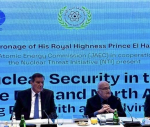You are here
Youth for peace
Aug 19,2015 - Last updated at Aug 19,2015
Not a day goes by without news reports and heartbreaking images of refugees and migrants, fleeing conflict, poverty or persecution, crossing seas and borders for a better, safer life.
The world has not witnessed such forced displacement since the United Nations was created 70 years ago out of the ashes of World War II.
Amidst the tragic stories and suffering, a glimmer of hope that I see is the growing awareness, despite the xenophobia and protracted crises, that we need new approaches to conflict prevention, resolution and peace building.
To explore new options, we have a global resource that until now has been largely overlooked, and it has nothing to do with science or technology.
It is the world’s young people who hold tremendous potential, if given the chance, to build more equitable societies and actively counter violence and extremism.
Today nearly a quarter of the world’s population is between the ages of 10 and 24. That is more young people than ever before. And more than 600 million of them live in fragile and conflict-affected settings, a group larger than the entire population of the European Union.
In Western discourse, violence and extremism are often labelled as the product of disaffected youth who are being denied the future they had dreamt of, falling prey to the lure and indoctrination of extremists.
This image does most young people a gross disservice.
While young people throughout history have tended to constitute the majority of the armed forces, they are also disproportionately victims of violence, in all of its forms.
Young people aged 10-24 make up more than a third of people displaced by conflicts and disasters worldwide. And violence is a leading cause of their death.
It is time to acknowledge that the vast majority of young people does not engage in violence, even in conflict settings.
In fact, young men and women have shown that they can — and must — be peace builders.
Later this week an extraordinary meeting will take place, hosted by Jordan, in partnership with the United Nations and international civil society organisations.
Hundreds of young peace builders from across the globe will gather in Madaba to discuss how they have been able to promote peace in their home countries, making their communities more resilient for the future, designing youth development and peacebuilding policies together.
One of them is Victor Ochen.
Forced as a child to flee the conflict between the government of Uganda and the Lord’s Resistance Army, Victor supported his schooling and his family by making and selling charcoal — even as schools and homes were burned to the ground and many of his schoolmates and neighbours were abducted and killed.
Even after he lost his mother because of the LRA and his brother and cousin were abducted, Victor chose the path of peace.
He worked with victims in his community; he graduated from university and then went on to found the African Youth Initiative Network to work for the healing of trauma and to promote youth leadership.
He is a true inspiration to us all, and was nominated for the 2015 Nobel Peace Prize.
The meeting in Madaba will feature remarkable peace builders sharing their stories from very different settings.
Even though young peace makers do not receive the media attention granted to youth fighters and extremists, I hope that we can recognise, and build on, the incredible value that they add to making our world safer and more stable.
In every region, young people are mobilising for peace. And they have a right to participate in peace building and decision making that will help prevent violence and enable people to recover from it.
But their participation and leadership must not be tokenistic. On the contrary, youth participation should be the rule, rather than the exception — institutionalised in peace processes, and enshrined in the very agreements that the international community makes for peace and security.
We can no longer afford to leave young people behind.
For the sake of every human being who has risked his or her life in search of a better one, for every person who suffers the devastation of conflict — for the sake of humanity — let us do our part to turn swords into ploughshares.
Let us build a new international agenda for peace and security that recognises and prioritises the rights, participation and leadership of young people for the sake of our common future.
The writer is United Nations under-secretary-general and executive director of the United Nations Population Fund. He contributed this article to The Jordan Times.












